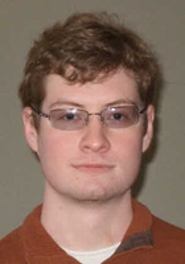
Studying the concept of infinity can be a daunting task, particularly because it requires approaching the idea from different perspectives. This summer Austin Heath ’15 is taking on that challenge by studying perceptions of infinity within three distinct fields. In his Emerson Foundation project, “Grasping Infinity: Philosophical, Mathematical, and Spiritual Conceptions of Boundlessness,” he is working with advisor John Stewart Kennedy Professor of Philosophy Richard Werner to trace the development of human analysis of infinity.
Heath was drawn to studying infinity because it is both an elusive and indispensable concept. He explained, “We have a hard time thinking about infinity because it’s not practical. We like to think of the world in finite sets and limits, but infinity is a necessary component of how we think. I’m interested in how people reconcile the way they think about infinity with a finite perspective on the world.” In order to grasp this concept, Heath decided to look at perceptions of infinity over time. “The original aim of my project was to track the historical development of the idea of infinity, and at the end of that historical development to see not only where the idea of infinity has ended up today, but how those three fields have dealt with and will in the future deal with the problems that remain,” he said.
Heath realized that in order to tackle such a large question, he would need to incorporate multiple fields of study. A philosophy major, his interest began with Plato and other classic philosophers, with whom he felt the most familiar. However, he realized that confining his research to one field would be limiting and decided to incorporate math and religion into his project. While he was originally hesitant about studying mathematics, with which he is less familiar, he’s found it to be one of the most intriguing aspects of his research. He commented, “This project has left me with an admiration of the beauty and creativity of really good mathematics.” Researching within three different fields also allows Heath to examine the interplay of different lines of thought from distinct perspectives.
Heath has found that scholars within all three fields grapple with some of the same thematic questions. It’s become such an important theme of his research that he described his project as “an exploration in how these three fields approach problems that are reoccurring.” Heath cited the example of an epistemological problem that has appeared in many approaches to understanding infinity. Philosopher John Locke proposed that it is impossible to conceive of a complete infinite series and that humans must always have a limited understanding of infinity. In the fourth century, St. Augustine dealt with a parallel issue when he claimed that human beings can never fully understand the characteristics of God because He is an infinite being. Similar ideas also appear in modern mathematics, particularly within set theory, which questions whether some infinities can be larger than others.
Heath has found that the different fields “in some way cover each other’s weaknesses.” Examining infinity from multiple perspectives presents different possibilities for solving the major questions about the concept. As Heath completes his research, drawing on knowledge across a wide range of disciplines and time, he’s achieved an awareness of what those key questions are and how our understanding of infinity has developed around them. Even if Locke and Augustine are correct, and a complete understanding of infinity is impossible, by the end of the summer, Heath will have a much fuller grasp of infinity and the problems in comprehending it than most of us can claim.
Heath is a graduate of Montgomery High School in Somerset, N.J.
